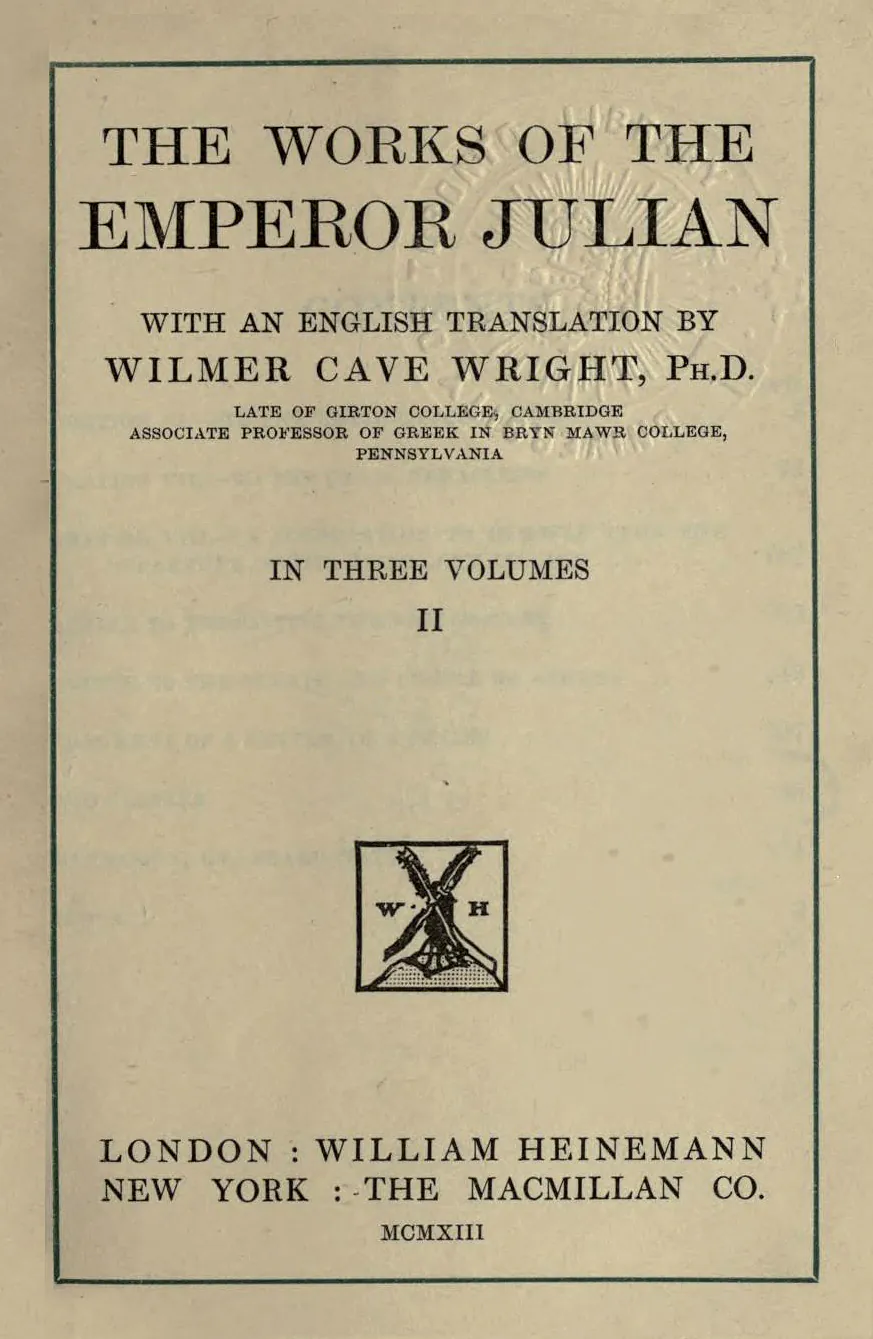[A]
Ἐμὲ δὲ ὑγρὸν βλέπειν ῥιπτοῦντα πανταχοῦ τὰ ὄμματα, ὅπως ὑμῖν καλός, οὔτι τὴν ψυχήν, ἀλλὰ τὸ πρόσωπον ὀφθείην, ὁ τρόπος οὐ συγχωρεῖ. ἔστι γάρ, ὡς ὑμεῖς κρίνετε, ψυχῆς ἀληθινὸν κάλλος ὑγρότης βίου. ἐμὲ δὲ ὁ παιδαγωγὸς ἐδίδασκεν εἰς γῆν βλέπειν ἐς διδασκάλου φοιτῶντα· θέατρον δ ̓ οὐκ εἶδον πρὶν μᾶλλον κομῆσαι τῆς κεφαλῆς τὸ γένειον, ἐν ἐκείνῳ δὲ τῆς ἡλικίας ἰδίᾳ μὲν καὶ κατ ̓ ἐμαυτὸν οὐδέποτε, τρίτον δὲ ἢ τέταρτον, εὖ ἴστε,
[B]
Πατρόκλῳ ἐπίηρα φέρων ἄρχων ἐπέταττεν οἰκεῖος ὢν ἐμοὶ καὶ ἀναγκαῖος· ἐτύγχανον δὲ ἰδιώτης ἔτι· σύγγνωτε οὖν ἐμοί· δίδωμι γὰρ ὃν ἀντ ̓ ἐμοῦ δικαιότερον μισήσετε τὸν φιλαπεχθήμονα παιδαγωγόν, ὅς με καὶ τότε ἐλύπει μίαν ὁδὸν ἰέναι διδάσκων καὶ νῦν αἴτιος ἐστί μοι τῆς πρὸς ὑμᾶς ἀπεχθείας,
[C]
ἐνεργασάμενος τῇ ψυχῇ καὶ ὥσπερ ἐντυπώσας ὅπερ ἐγὼ μὲν οὐκ ἐβουλόμην τότε, ὁ δὲ ὡς δή τι χαρίεν ποιῶν μάλα προθύμως ἐνετίθει, καλῶν οἶμαι σεμνότητα τὴν ἀγροικίαν καὶ σωφροσύνην τὴν ἀναισθησίαν, ἀνδρείαν δὲ τὸ μὴ εἴκειν ταῖς ἐπιθυμίαις μηδ ̓ εὐδαίμονα ταύτῃ γίνεσθαι. ἔφη δέ μοι πολλάκις, εὖ ἴστε, ναὶ μὰ Δία καὶ μούσας, ὁ παιδαγωγὸς ἔτι παιδαρίῳ κομιδῇ, Μή σε παραπειθέτω τὸ πλῆθος τῶν ἡλικιωτῶν ἐπὶ τὰ θέατρα
[D]
φερόμενον ὀρεχθῆναί ποτε ταυτησὶ τῆς θέας. ἱπποδρομίας ἐπιθυμεῖς; ἔστι παρ ̓ Ὁμήρῳ δεξιώτατα πεποιημένη· λαβὼν ἐπέξιθι τὸ βιβλίον. τοὺς παντομίμους ἀκούεις ὀρχηστάς; ἔα χαίρειν αὐτούς· ἀνδρικώτερον παρὰ τοῖς Φαίαξιν ὀρχεῖται τὰ μειράκια· σὺ δ ̓ ἔχεις κιθαρῳδὸν τὸν Φήμιον καὶ ᾠδὸν τὸν Δημόδοκον. ἔστι καὶ φυτὰ παρ ̓ αὐτῷ πολλὰ τερπνότερα ἀκοῦσαι τῶν ὁρωμένων·
Δήλῳ δή ποτε τοῖον Ἀπόλλωνος παρὰ βωμὸν
Φοίνικος νέον ἔρνος ἀνερχόμενον ἐνόησα.
[A]
No, my temperament does not allow me to look wanton, casting my eyes in all directions in order that in your sight I may appear beautiful, not indeed in soul but in face. For, in your judgment, true beauty of soul consists in a wanton life. I, however, was taught by my tutor to look on the ground when I was on my way to school; and as for a theatre, I never saw one until I had more hair on my chin than on my head,1Xenophon, Symposium 4. 28. and even at that age it was never on my own account and by my own wish, but three or four times, you must know, the governor who was my kinsman and near relative,
[B]
“doing a favour to Patroclus,” ordered me to attend; it was while I was still a private individual.2i.e. before he had been appointed Caesar. Therefore forgive me. For I hand over to you instead of myself one whom you will more justly detest, I mean that curmudgeon my tutor who even used to harass me by teaching me to walk in one straight path3cf. 352 C. and now he is responsible for my quarrel with you.
[C]
It was he who wrought in my soul and as it were carved therein what I did not then desire, though he was very zealous in implanting it, as though he were producing some charming characteristic; and boorishness he called dignity, lack of taste he called sobriety, and not yielding to one’s desires or achieving happiness by that means he called manliness. I assure you, by Zeus and the Muses, that while I was still a mere boy my tutor would often say to me: “Never let the crowd of your playmates
[D]
who flock to the theatres lead you into the mistake of craving for such spectacles as these. Have you a passion for horse races? There is one in Homer,4The chariot race in Iliad 23. very cleverly described. Take the book and study it. Do you hear them talking about dancers in pantomime? Leave them alone! Among the Phaeacians the youths dance in more manly fashion. And for citharode5The citharode played and sang to the lyre: Phemius was at the court of Odysseus in Ithaca; Demodocus in Phaeacia. you have Phemius; for singer Demodocus. Moreover there are in Homer many plants more delightful to hear of than those that we can see: ‘Even so did I once see the young shoot of a date palm springing up near the altar of Apollo on Delos.6Odysseus thus refers to Nausicaa in Odyssey 6. 162.
EN translation: Wilmer Cave Wright, 1913
LEARN MORE
Place your mouse over a term to see corresponding popup from Wikipedia.
ALL PAGES

| Title | London: The Works of the Emperor Julian, Volume II/III |
| Publisher | London: William Heinemann |
| Year | 1913-23 |
| Pages | 416-511 pp. [vol. II: 538 pp.] |
| Translation | Wilmer Cave Wright. PhD |
| Editors | T.E. Page and W.H.D. Rouse |


